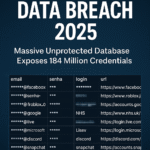Massive Unprotected Database Exposes 184 Million Credentials Across Major Platforms
A publicly exposed database containing over 184 million unique logins and passwords — totaling 47.42 GB of raw credential data — was discovered without any password protection or encryption. The exposed data included credentials for a wide array of services, from email providers and financial institutions to social media platforms and government portals.
What Was Exposed?
A limited sampling of the documents revealed:
-
Thousands of files with emails, usernames, passwords, and login URLs
-
Services impacted included Microsoft, Google, Facebook, Instagram, Roblox, Discord, NHS, Snapchat, and more
-
Government domains (.gov) and business credentials
-
Bank and healthcare account credentials
-
Files labeled “senha” (Portuguese for “password”) suggesting Brazilian or Portuguese origin
Discovery and Response
The IP address hosting the database was tied to two domain names:
-
One is parked and inactive
-
The other is unregistered and available for purchase
The Whois records were private, preventing identification of the owner.
A responsible disclosure notice was immediately sent to the hosting provider. Access to the database was restricted shortly after. However, the provider declined to share customer details, so the intent — criminal or otherwise — remains unknown.
Signs of Infostealer Malware
Analysis of the structure and contents suggests that the credentials were likely collected using infostealer malware — malicious software that extracts stored credentials from infected systems. Infostealers often gather:
-
Saved browser passwords
-
Autofill data and cookies
-
Crypto wallet info
-
Screenshots or keystrokes (in advanced variants)
These tools are typically delivered via:
-
Phishing emails
-
Malicious websites
-
Cracked software
Validation Efforts
To confirm authenticity, I contacted multiple individuals listed in the exposed data. Several validated that the passwords shown were accurate and in-use, confirming the data’s legitimacy.
Many individuals treat their email inboxes as unofficial cloud storage, which often includes tax forms, medical records, contracts, and sensitive PII — all of which can become vulnerable once account credentials are exposed.
Potential Risks from This Exposure
The potential misuse of this data spans multiple high-risk scenarios:
1. Credential Stuffing Attacks
Using exposed email/password combinations across other services — especially where users reuse credentials.
2. Account Takeovers (ATOs)
Once access is gained, attackers can steal identities, commit fraud, or target others through the victim’s accounts.
3. Corporate Espionage
Exposed business accounts could lead to ransomware attacks or the theft of confidential business data.
4. Government Risk
Compromised .gov email addresses pose serious risks, especially if tied to sensitive access.
5. Social Engineering & Phishing
Old or inactive credentials still allow attackers to craft highly convincing phishing attempts or social engineering campaigns.
What You Should Do
✅ Change Passwords Regularly
Especially for your primary email and financial accounts. At minimum, change passwords annually.
✅ Use Unique Passwords for Every Account
Avoid reusing passwords. Each service should have its own strong, unique password.
✅ Enable Two-Factor Authentication (2FA)
This adds a critical layer of protection, even if a password is exposed.
✅ Check for Credential Exposure
Use services like Have I Been Pwned to check if your email has appeared in breaches.
✅ Use a Password Manager (Cautiously)
They help manage strong, unique passwords — but if compromised, they pose risks. Keep the master password secure.
✅ Invest in Antivirus or EDR Tools
Keep antivirus updated. For advanced users, EDR tools can detect abnormal behavior and stealthy malware.
✅ Regularly Audit Your Email
Delete old sensitive emails and avoid storing PII in your inbox. Use encrypted cloud storage instead for document sharing.
Credit to Jeremiah Fowler https://www.websiteplanet.com/news/infostealer-breach-report/


Comments
Massive Unprotected Database Exposes 184 Million Credentials Across Major Platforms — No Comments
HTML tags allowed in your comment: <a href="" title=""> <abbr title=""> <acronym title=""> <b> <blockquote cite=""> <cite> <code> <del datetime=""> <em> <i> <q cite=""> <s> <strike> <strong>